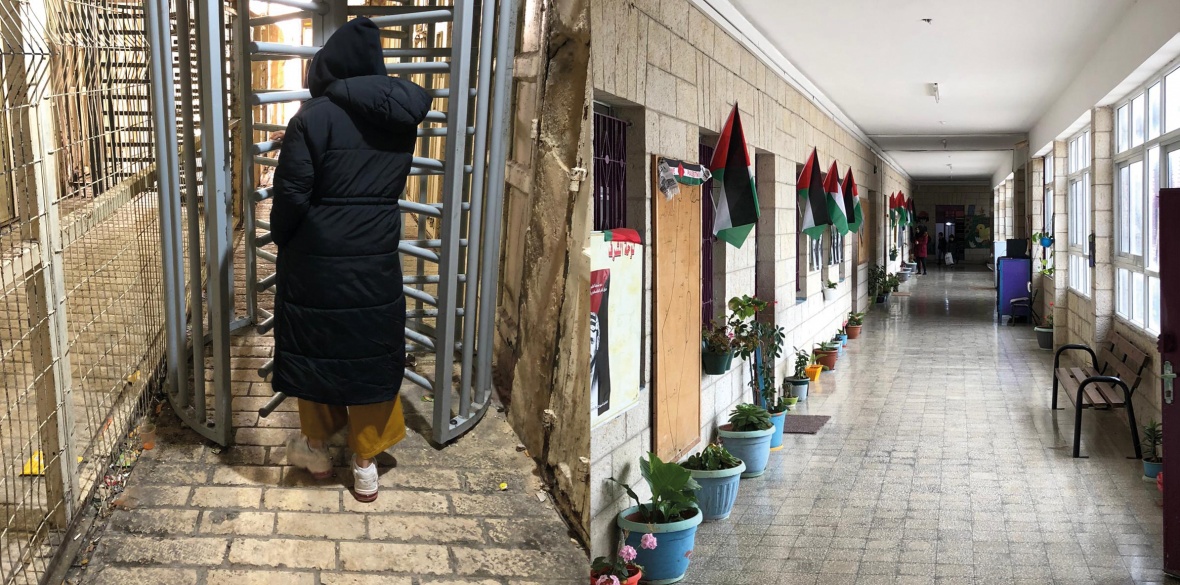This is the last article you can read this month
You can read more article this month
You can read more articles this month
Sorry your limit is up for this month
Reset on:
Please help support the Morning Star by subscribing here
“WE need every free voice in the world to stand with education in Jerusalem” — Saed Erziqat, general secretary of the General Union of Palestinian Teachers.
On a recent National Education Union delegation to Jerusalem and the occupied West Bank, education professionals from England and Canada visited six schools, met national and regional GUPT officials, teachers, student activists and a number of human rights organisations.
Palestinian teachers were on strike because funding from Israel to Palestinian-run authorities was cut by 22 per cent last year leaving teachers being paid only 80 per cent of their salaries, with some taking second jobs to make meagre ends meet.
Erziqat and the GUPT leadership are under fire by some for not supporting these strikes. They say teachers are losing money, the Palestinian Authorities have been starved of funding and just can’t pay full wages.
Meanwhile Israel, which has created these conditions, is offering Palestinian teachers more lucrative contracts to move to schools teaching the Israeli national curriculum.
Some teachers have been tempted by increased pay and others hold on to the Palestinian curriculum and their national identity therein taught. Divide and rule over an ideological battlefield.
The Ministry of Education in Jerusalem has been closed and some Palestinian schools have had demolition orders. One school we visited had to move to a Jerusalem mid-terrace townhouse with cramped, makeshift classrooms in bedrooms, floorboards missing, loose wiring and inadequate hygiene facilities.
“We fight to stand still,” said our host, a former engineering lecturer, now project managing this school relocation.
“The children had nowhere to exercise so we fenced off the roof and put a temporary shelter up to keep the rain off — that’s had a demolition order too.”
“There is no safety for our students or our teachers,” continues Erziqat, citing the story of seven-year-old Rayan Suleiman whose heart stopped while running away from the Israeli soldiers chasing him and his brothers on their way home from school last year.
Attendance cannot be guaranteed. We heard first-hand stories of children being stopped at checkpoints and delayed on their way in to school, watched film footage of Israeli soldiers preventing children from leaving school at the end of the day and saw photographs of children who had been injured at checkpoints, including one of a seven-year-old girl who said her front teeth had been smashed by an Israeli boot. Scarred for life.
“I might not make it into school. I pass three checkpoints on my way,” said teenage journalist Janna Jihad who can’t decide if she wants to go on to study journalism or chemistry.
“They’re not checkpoints, they’re barricades.”
In a boys’ school in Hebron we could see from the road, the school gate itself is a checkpoint, guarded by teenage soldiers with grenade launchers slung over languid limbs.
When the former Israeli justice minister Ayelet Shaked called Palestinian children “snakes” — and there is a belief that they are all potential terrorists — the justification for checkpoints is given. They create tension and dispute; vindication of power and a permanent edge of threat.
These are children. Just children.
The head teacher of one basic school we visited counters these painful narratives with love.
Here the children are to be valued and are precious, no matter the hate they might experience outside.
“I am a grandmother. They are all as my grandchildren,” she says of the 200 primary children she welcomes each day by name, ruffling their hair as they run into her arms shouting “Me first!”
She led us to observe an English lesson where the children were learning their Palestinian heritage through song and jumping through hoops, connecting historic sites with towns they may never be allowed to visit.
Former Israeli president Ariel Sharon said: “A people cannot exist if there is no social solidarity.”
Changing history through a school curriculum separates children from their heritage, denying future generations their cultural inheritance and story, while cracks widen between teachers through reduced pay, and incentivised moves to another curriculum widen and fracture.
The head teacher and staff at a primary school outside Ramallah told us the staff is a family and they hold together to manage the difficulties they face.
“It is how we cope. We support each other and so we support the children. It is all we can do.”
When it is life-threateningly dangerous to challenge the cause of their oppression, striking against the Palestinian Authority is a means to challenge and fight back. Striking gives voice and affirms self-efficacy.
Strike action is bonding, building camaraderie in struggle — sustaining solidarity.
Anya Cook is an NEU and UCU activist.











